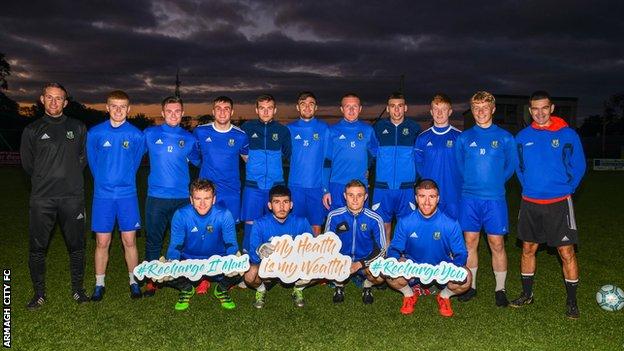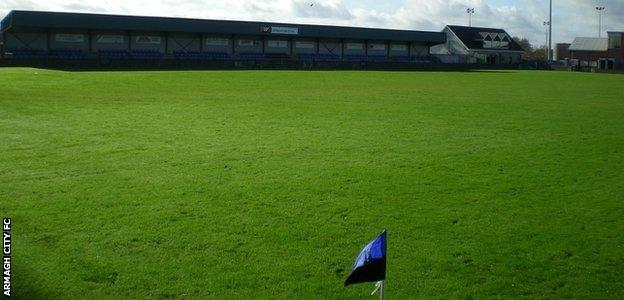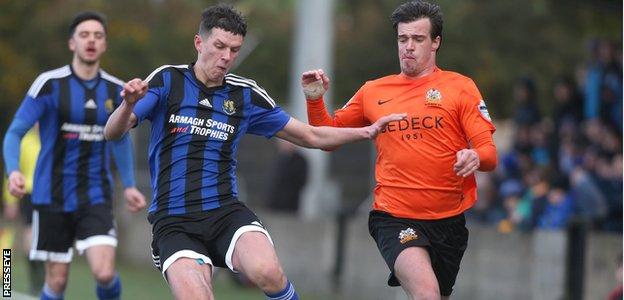Slipping through the cracks: Armagh City urges support for 'tomorrow, not just today'
Last updated on .From the section Irish

Armagh City Football Club closed their facilities on 13 March, a week before Northern Ireland's lockdown came into force.
Things were only heading in one direction and the club were cautious that they did not want to facilitate large gatherings at a time when people were becoming increasingly anxious about what was to come.
Complying with restrictions in the two months that have followed has not been a problem, as chairman club Aidan Murphy says, the club will take its guidance from the experts.
Murphy felt it important for all clubs to close their doors in March, and understands it remains equally important that they continue to do so until it is safe to re-open.
- Slipping through the cracks: Banbridge RFC
- Slipping through the cracks: Tír na nÓg GAA
- Slipping through the cracks: Ulster hockey
But what Murphy feels must not be lost in the coming months, as the lockdown restrictions are eased, is how equally important it is that the clubs are still in place when the time for re-opening eventually comes.
"Inevitably people are probably getting into bad habits during lockdown, adding weight on that they could probably do without," says Murphy.
"I think sport coming out of this lockdown has a very important part to play.
"The government and governing bodies have to realise that this is something that is important to look at because, yes, we are dealing with the current situation and health is the most important thing, but you also have to look at the long-term picture.
"I understand in the middle of a crisis that you have to think about today, but we do have to think about tomorrow because you don't want to move the health service from one crisis to another."
Health benefits of sports clubs are not merely aerobic, and Murphy believes Armagh City's role is as much about offering its members a support network as it is about physical wellbeing.
"Players at any level enjoy the camaraderie of the dressing room," he says.
"The banter, the music that goes on before the matches, there is a great feeling around a sporting club.
"Especially for the younger children they would want to be back tomorrow, and we'd all want to be back for their benefit."

Armagh, whose senior side play in Northern Ireland's third tier, missed out the Executive's £25,000 hospitality, leisure and tourism grant as their rateable value fell £2,500 short of the required figure.
This has left the club with only the £2,000 sports Hardship Fund to offset the losses they have suffered from the absence of their usual revenue streams, namely pitch rental, sponsorships and bar takings.
Although appreciative, Murphy argues that the small grant will do little more than see the club through the next few months in a situation that, even with a return to play, will have a trickle down effect on how the club operates for the foreseeable future.
"As time goes on and you understand that we would possibly have to come out of lockdown with the cleansing of facilities, social distancing and the lack of spectators then the total cost involved in hosting a match may be prohibitive to small clubs," he warns.
"Really we are in the lap of the Gods as to when we get started.
"Bars are at the very end of the queue for reopening and even if we can open, with social distancing having to come into play it probably wouldn't even pay to reopen.
"All small clubs will rely on a support of members, parents, supporters and sponsors.
"The difficulty is that both individual parents, sponsors and businesses won't have the capability (to financially support the club).
"They simply will not be in a position to support the clubs in the way they have in the past."

Sports clubs 'even more vital' after pandemic
The process, says Murphy, is not as linear as moving from a complete shutdown to business as usual.
As part of the pathway to a 'new normal', the Armagh chairman is calling on the government to acknowledge sports clubs are among the bodies that will be unable to operate at full capacity for some time to come.
That, coupled with the important health and social roles clubs play in communities across the country, demands greater and urgent financial support says Murphy.
"Most sporting clubs don't have an emergency plan, a pot of money waiting for any eventuality," he says.
"There are lots of well organised clubs but regardless of how well-structured and managed they are, this is something no-one has foreseen.
"I think the likelihood is that some clubs will find it very difficult to survive.
"That's why it is up to everyone in sporting authority and government to realise the benefits that all sporting clubs provide for a population.
"It may well be that they'll be even more vital as we come out of this situation."